“I never said most of the things I said.”~Yogi Berra, American athlete
Here’s a look back to 2010. Good stuff. Sad stuff. It’s nice to know it happened.
“I never said most of the things I said.”~Yogi Berra, American athlete
Here’s a look back to 2010. Good stuff. Sad stuff. It’s nice to know it happened.
“Love isn’t something you find. Love is something that finds you.”~Loretta Young, American actress
This morning, my husband woke me up, held my hand and whispered, “Happy 14-year Engagement Anniversary.”
Sometimes I forget how sentimental he is. We sit in the same room at home, both on our laptops or smartphones, and we might not talk or say anything meaningful for an hour. We text each other when we’re at work. Some days we eat dinner at different times. It’s easy to get lost in the day-to-day expectations of cooking, running the dishwasher, emptying trash and replacing the roll of toilet paper to appreciate us. Anyone who says marriage is always pure bliss hasn’t woken up from their dream yet. But together, he and I have formed an Us.
My husband is active on one online social media outlet, and he reads me some posts that others write: their job sucks; their wife complains about the toilet seat; the divorce is messy; the holidays are depressing because they’re alone; the kids are a pain in the…; the wife doesn’t listen; and so on. He doesn’t post anything negative as a general rule–you never whose boss is reading what post of what friend who knows someone who is complaining about something relating to that boss or friend–and he’s private enough to refer to me only as “my wife.” When he does make a comment regarding me, it’s either genuinely complimentary or it’s a joke with a smiley face emoji just in case. 🙂
Seriously, we have a strong relationship together. I know that, my friends know that, but I didn’t know his friends knew that until he read me what he wrote last week in response to one of those depressed-because-women-and-relationships-suck posts.
It made me melt.
I don’t often hear that from him, not in those exact words. I see it from him when he takes out the garbage or changes the roll of toilet paper. We play Yahtzee in coffeeshops. He brings home bagels for breakfast some Saturdays. He kisses me when I come home from work. I hug him every morning before he leaves for work. Living in New Jersey during 9/11 made me realize that there might not be a next time to appreciate someone, so I work hard to have no regrets when one of us walks out the door. I say “I love you” at the end of every phone call to everyone. I hope you do, too. There’s no opportunity to take back what’s unsaid.
He shows me his moments of deep, deep love and caring; I don’t always pay attention to them. That’s my fault. I was caught off-guard by his comment this morning, but I shouldn’t have. After all, he proposed to me 14 years ago today–the same date that his parents got married–and I said yes. I’m still saying yes today. So is he.
“The true sign of intelligence is not knowledge but imagination.”~Albert Einstein, German scientist
I now understand why beta readers are so important to writers.
Since I moved to Michigan, I have relied on my Deadwood Writers Group for input and feedback on my memoir. The members have been fabulous at making me think of my story elements in a different way. They point out inconsistencies; I rearrange my sections. Do I have a meandering Info Dump? I tighten my text. Too many pronouns? I revise. Dude, these folks are it. I didn’t need anyone else. These people rocked it.
And then I had someone else read a segment of my memoir. That changed everything.
Not literally everything, but what a spinning perspective. My Writers Group has lived this memoir for years. Long-time members know the story, approach and my overall goals, so I’m sure they base feedback off that. They’re familiar and comfortable. The author who reviewed the exact same chapter had an outsider’s outlook with no bias.
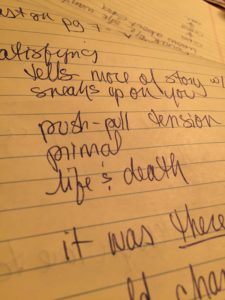
My notes from the critique. Insightful.
She co-hosts a bimonthly writer workshop in Ann Arbor. On the first Thursday, there is a topic presentation, and on the third Thursday, there is a networking meeting with the opportunity to have five pages of your work in progress critiqued by the co-hosts. I was curious about feedback, so I brought the same five pages that Deadwood writers group reviewed last night.
One area I asked for feedback on is the book’s opening introduction and the two ideas I have for that. The first option is fast-paced and a scattered. There is internal dialogue as the main character runs into the hospital after hearing potential bad news. The intention is to wow the reader with action and emotion. It packs a punch, and some people enjoy the rush. I like the breathless way it opens. The second option is slower with dialogue between the main character and minor players. This opening offers insight and reflection about the main character’s perspective and opinion of a priest who is rushing to do a Last Rites sacrament. It provides a base to establish the situation: tense, questioning and page-turning.
This author immediately said the second, slower one was best. She gained sympathy for the character, and found humor in the reaction to the priest. You see a lot of beliefs and perspectives in the main character, and it’s a strong base to continue in the story.
“What about the other opening?” I asked. “What are your thoughts on that? Why don’t you prefer that?”
“The end is already determined,” she said.
Oh. There is little drama despite the action. As written, the slower beginning has hope and possibility while the energetic one is almost running to the story’s inevitable end.
I never thought of that.
My writers group couldn’t offer that unbiased perspective because they’re years entrenched in my story. They know the beginning, middle and most of the end. This woman did not.
“Don’t change anything here,” she said. “It’s perfect the way it is. Don’t change it.”
She went on to talk about the transitions. My memoir is a collection of related but not necessarily chronological events that relate to one theme or lesson. The two events that open the first chapter–Lesson One: Get Out–need to be there to establish background, but this author suggested a different order.
“After the first section, the mugging and the grandmother’s reaction to it, I want to know about this ‘tough old broad.’ You jump into this bus riding part. Why is riding a bus so dislikable? Is it a class thing? It’s distracting and slows the story. I want to immediately follow the likable grandmother character, which is strong compared to the bus part.”
I never considered rearranging the two, but I never saw it from the perspective that readers might connect with the grandmother and then feel distanced or cheated by not immediately knowing more about her.
Those two points of critique, as well as the other comments she offered, give me a different way to approach this story. Not just the first chapter but in looking at the characters and the flow of events. Maybe I introduce a character and follow him/her around before transitioning to another character scene or event. I can even make those transitions more active by considering the perspectives they open with.
I could never have gotten this input from my writers group, not even with the newer members. Any critique they could offer could be tainted with comments by the longer time members.
I will never give up my treasured writers group, people who are deliciously ruthless and challenging to me and my writing. They know my story, so they can offer suggestions to help me reach my intended goal. The attachment these people have with my characters, love or hate, is valuable. It is not a detriment. However, I can’t rely on them entirely, I shouldn’t if I want my story to be the best it can be. Getting an untainted perspective along the way is just as worthwhile. When authors talk about needing beta readers, I understand now why there’s value to that. I am fortunate to have a strong critique group, and I now know that an outside opinion and perspective is just as useful in a different way.
“Do not dwell in the past, do not dream of the future; concentrate the mind on the present moment.”~Buddha, Hindu leader
Where did I leave off with A Round of Words in 80 Days?
I totally lost sight of my goals and my plans. I can’t pinpoint where and when that happened–does it really matter?– but I’m having a hard time finding my way back.
My Happy Planner has turned into my dumping ground of hopeful To-Dos, which at least declutters the dozens of yellow sticky notes that had engulfed my workspace.
I’m disappointed that I didn’t promote my Father’s Day eBook earlier. I didn’t make a plan or write down any goals, so I had no direction.
A rash on my arm became infected, and both the daily doctor visits and the antibiotics threw my body into a state of wonkiness. Antibiotics are my antagonist.
BEA books and swag are unsorted. Blog posts remain in draft mode. It’s embarrassing. Life has unraveled, so it’s time to reign some of it back in.
Looking back to see what the heck I was working on, here are five goals in no particular order that show progress or promise.
1. Complete A to Z Challenge posts for 2015 and 2016.
2016: April ended, and I was still composing poetry. Alphabet haiku are harder than I expected. Some days it took me 40 minutes to complete one, and that includes looking up words on Scrabble-wordfinder-type websites. Just today, I finished the last one, so now I will format them through various phone apps to make them look visually appealing, which was the idea behind all this. I will publish these posts sporatically throughout the summer so that you, dear readers and followers, won’t be overwhelmed with post after post after post. Doing this also ensures that everything transfers to my new website.
2015: As for last year, I did not finish procrastinating Jayne and her Writerly Self. The drafts are there, but the motivation is not. I’m not sure what I’m going to do with them, but that’s for another time.
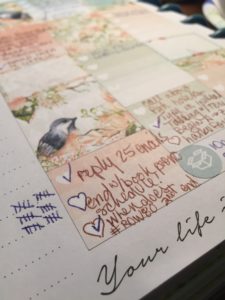
I’m an overachiever!
2. Catch up and keep up with email.
My initial goal was 10-25 emails/day, leaning towards the upper range of that. Deleteing junk and spam emails doesn’t count. I decided to try visual motivation: I made hashmarks for every email that I read, replied to or deleted after review. It was soooooooo satisfying to see the checkmarks that I superceded my goal the first day and answered 30 emails. That visual is motivating, and I will continue doing this, but I may change the daily attack schedule.
3. Complete my Happy Planner blog/social media planner pages.
Scheduling my life keeps me on track, but making these sheets was a noble goal that turned out to be a procrastination tool. In frustration last week, I grabbed one pre-punched sheet of paper and drafted a sloppy schedule. It’s not pretty nor final, but the rough sketch was eye opening. Here is a plan that looks achievable and is flexible. One thing it forced me to do was post on my stagnant Facebook Author Page and that’s been a success. Since then, I received 3 more Page Likes and increased my reach/insight/whatever Facebook analytics calls it now. I feel professional. I also feel control over Facebook; it does not control me. I am not intimidated anymore because I’m using it on my schedule.
4. Update one thing on my blog each week.
I traveled first three weeks in May, two weekends in a row driving four hours from Detroit to Chicago. The issues uploading photos and videos to this site continued, making the perfect excu–I mean, reason–to fall behind in my blog posts and neglect my pages. I’m still having upload problems, but I can no longer let that stop me from blogging. Reflecting back to my goal of one item a week, I gave myself permission to update one page at a time, and it could be rough as long as it was coherent. My first update: the “About Me” page is the most important because it’s an overview of me and my site. If a visitor explores this site, that’s the page I expect they’d go, so that needs to be the cleanest.
It turns out that while editing About Me, much of the text there belongs on my new page, “Writing Adventures.” I cut-n-pasted that text and tucked it over there to work on. That’s the next page I’ll work on, followed by “My Books.” Looks like I have a goal in mind for ROW80, Round 3.
5. Promoting my books.
Speaking of books, the lack of promoting my Father’s Day book, Lessons from Dad: a Letter to You, has been disastrous. I’ve done nothing. A wasted opportunity. Eternally hopeful, I jumped on Fiverr to see what the site’s all about. It’s a place where creative folks post their services on whatever for $5 per gig. In about five minutes, I found a potential editor. His gig edits 5000 words. By cutting out my book’s preface and other text used only for publishing, I dropped word count down to 4956 words. What the heck? It can’t be any worse that what I did or didn’t do. I spend $5 on a Frappuccino, so what $5 for a 1-3 day turnaround for someone to review my grammar and punctuation.
In one day, he returned the edited text to me. There were punctuation corrections and not much else. Was he that sloppy or was I that good? For $5, he was responsive, professional, and I tweaked the text enough that I’m comfortable uploading this new version. I’m querying a cover designer now.
And off I go.
I found out about my friend’s brain surgery on Facebook today.
What the *BLEEP*!?!
I just happened to be on Facebook after, oh, it’s been a few weeks, and her status update just happened to be the first in my feed. The photo she posted reminded me of those mental institution patients you see in movies, the ones with shaved, scarred heads being wheeled around by a nurse in white labcoat. My friend’s status was vague yet positive, something like “I can now focus on objects.”
The photo was not comforting. My friend is a zombie.
What the *BLEEP*!?!
I called her right then. She answered and asked me how I was doing, calmly, as if she’d never had a headache that turned into emergency surgery. The worst part of it all, she said, was missing her son’s graduation. I don’t know, to me death would have been a worse outcome, and she’d have still missed the graduation. As we talked, I think she comforted me more than the other way around.
Now some of you may have skipped over the whole scary zombie thing and focused on my earlier comment that I hadn’t been on Facebook in weeks. I’m not a Facebook frequent flyer. That’s everyone else’s dumping ground.
Why did I find out about my friend’s life-and-death situation on FACEBOOK?!?
We’ve been friends since college. Road trips, frat parties, New Orleans, Broadway shows, parades and late-night cry fests…we’ve done it. Together. Didn’t I deserve some personal acknowledgement from her or her family members rather than being lumped into this generic blast to all the random people she has Friended over the years?
I was pissed.
Sadly, this is not the first shocking news I received via social media. Last year, if I hadn’t randomly opened Facebook one day, I would not have known that another dear college friend’s father died. What an awkward conversation that would have been at the holidays.
Me: “Hi, how’s your dad doing?”
Friend: “My father died three months ago.”
Me: “Oh.”
When my parents died, I called the Important People in my life to speak to them personally. When I was too choked up with tears, my husband called the rest. Every other friend and family member received an email. The general world wasn’t informed because the general world didn’t need to know. My friends did. You know, my real friends.
I expect the same of my friends, death or near-death. Perhaps I expect too much.
Wait…why hadn’t I talked with her recently to know she was having headaches? Why haven’t I regularly emailed friends who know her and could tell me? Why haven’t I emailed or called my friends recently? Why have I ignored those dear, dear friends in my life?
Now I’m pissed at myself. I’m as much to blame as for not knowing. Ignoring each other is a two-way street of uncommunication.
Why haven’t I reached out? I always–and I mean always–feel pumped after talking to a long-lost friend. I hear their voice, which takes me back to the time when we were together and became friends. If it’s been weeks, months or years, what common interests do we still have? How do we start: “Hi, how’s the weather?” I feel awkward not knowing what I don’t know. That stops me sometimes, and I know the best way to overcome that is to call and call often. Or write letters, send emails…anything personal works.
Why do we push Send/Post/Update/Tweet/Publish/Share and think that’s enough?
We’re far too busy to contact everyone directly, or so we think. Call someone today. Even if you get their voicemail, tell them you were thinking of them and miss them and love/appreciate/care about them. Hug someone. Drag a friend out for coffee or meet them at work for lunch. Going out of your way for a friend is not going out of your way.
I’m making it a point to visit my brain-injured friend soon, and if she’s not well enough for company, I’ll at least call and chat again. That’s long overdue.
“Live as if you were to die tomorrow; learn as if you were to live forever.”~Mahatma Gandhi, Indian leader
Social media: think you know everything? I don’t, but I thought I knew more than I did.
Tonight’s Emerging Writer’s Workshop will be a refresher for me, right? Nope. I left with five vital pieces/nuggets of advice. Ultimately, you want to be an expert, as in: “When I [agent/editor] Google a keyword, you [author] come up.” Be there or be square. Social media can give you that legitimacy, validation and exposure. In order to make social media work for you, you have to know how to work it.
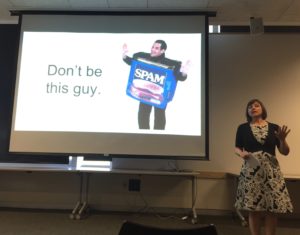
Alex Kourvo discuss spam…media not the food product
1–Don’t spam on social media.
Okay, this one I did know, but tonight gave me a different perspective. I’ve heard the 80/20% rule of not promoting vs. promoting your book, but 90/10% is recommended. Think: “What am I there on social media for? Am I here to buy a book?” No, you’re there to catchup with your friends, read updates and share information, not to read spam. Don’t do it to others. Just don’t; it’s rude.
.
.
.
2–Don’t just talk business.
Use social media as a tool to share your perspectives and boost other writers. I love this Tweet idea shared tonight:
“My followers, [author I know]’s book cover looks like [well-known book] so check out [author I know book’s title].”
Don’t expect favors, though. Make a connection because you want to, not because you want them to. Karma comes back to you, good or bad.
3–Social media doesn’t sell books.
But it does increase awareness. Use your superpowers to highlight not only your book but also upcoming events, causes you support and personal interests. You’re a 3-dimensional person; make that show.
4–Be consistent with any site you use.
When you blog, have a realistic schedule and maintain it. Don’t disappear for two months. Set aside time specific time each day or week to reply to Tweets, updates and Likes.
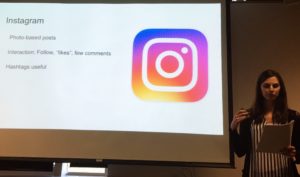
Bethany Neal discusses social media on specific platforms
Give yourself permission to tailor your content for specific audiences on each media platform. For example, use: Twitter for book reviews; LinkedIn for writing advice and marketing; Facebook to post jokes; and Instagram to share pictures of your puppy. Followers are following you for a reason, so keep that focus. You can change at any time, of course, but if you’re engaging on a platform for a specific reason, stay true to that goal.
5–Don’t make your social media stream all look-at-me-me-me!
The biggest tip I got from this part was to not quote book reviews. Simply say. “[Company/Blogger/Site] reviewed my book, Wow! [provide link]” and share that. Let people celebrate with you.
The coolest bonus tip I learned was: Stand in the longest checkout line at the store so you have that additional time to update, Like and retweet on your social media platforms.
Suddenly, grocery shopping is more motivating.
I used to be all about the me-me-me approach to self-promotion, but now I realize that sucks.
Oh, you should be proud of your work. I am; my writings are great. As Barbara Fine said at BEA16, “No one cares as much about your book as you do.”
So true…which means no one wants to hear all about your book all of the time.
An author I follow on social media–who will remain nameless–had her first book published. Yay! That’s awesome! She’s doing book tours and signings, and I admit, I’m a smidge jealous of her opportunities, ones I don’t have yet. However, all she shares with her fans and followers is her writing signings and appearances, so much so that her feeds are boring. I mean, really boring.

Lucky the puppy, relaxed or bored?
She writes in a genre that I don’t write in, on a subject that doesn’t interest me. I doubt I’d ever read her book, but I don’t have to read it to be supremely supportive of her accomplishments. However, it’s hard to get excited when all she blogs and Tweets about is my book–my book–me and my book!
I’d have to go back through her feeds from months or years ago to find out if she ever shared other things, like personal quotes, her writing space, photos of something other than her book cover, stories about her pet, travels, anything. I’m curious, but it’s not worth it to go back.
What would make her better? She could add tips to up-n-coming authors about the do’s and don’ts of book signings. She could share her mistakes, funny stories, and her inspirational insights. She could offer suggestions about how to get those book signings, places to contacts, things and events to look for.
What does she offer her readers and followers?
Nothing. Nothing but book news and updates.
With every update, I ask myself, should I point this out to her? I don’t because I don’t want to insult the author. Would that change her approach? I don’t want to sound bitter, and I don’t know her well enough to gauge her reaction to my unsolicited criticism. Heck, I don’t know her at all. There’s no connection because there’s no substance.
I used to do that, plugging my books with a link at every opportunity I had because I am proud of them. Plus, I want to sell books. My wake-up call came when one of the judges from last year’s NFPW Communications Contest commented on my blog post contest entries, “Writing is OK, but too self-promoting to keep this judge interested.”
Oopsi.

I like naps. A lot.
I refocused after that and like to think that now my followers and fans know me, at least a little. I graduated from Penn State; I write memoir and haikus; and my in-laws have a puppy that my husband can’t stop talking about. I belong to several writer’s groups; I wear funky socks; and I’m a Certified Zentangle Teacher. To-Do lists are my friend and my enemy; I write in coffeeshops with colored pens; and I scrapbook. If you didn’t know anything about me before, now you do.
See what I did? I made a connection with you. Whether you like Penn State or not, scrapbook or not, prefer tea over coffee, whatever, we have a common ground to begin a conversation from. You may not agree with all of my interests, but most likely you follow me because of one or more of those connections. Because of our connection, every time I publish something or my writing is acknowledged in some way, you can be supportive of me without ever reading my book…but I hope you will read!
I want to support a fellow author an writer, and that’s why I still follow her on social media. However, that’s all I do because it’s hard to be supportive of a stranger.
“Age is just a state of mind.”~Abhisek Bachchan, Indian actor
“Life is better with a plot.” That’s the tagline of Beautiful Madness Book Case, a new subscription service, two months old as of this post. The owner, Julia, is a former bookstore manager who approaches her kits with the philosophy of a care package: enjoy the overall experience of reading a book with a drink and a snack at your side. Each kit comes with all three of those plus bookish related items.
The whole mail-mystery-box-book-subscription began more than a year ago with Tracey Lynn Tobin’s unboxing videos on her blog No Page Left Blank.
Around this time, a writerfriend in my critique group showed off a Mockingjay necklace from her monthly Owlcrate mystery box. Every box has a book plus 5-7 themed paraphernalia. I was all over that so I started a subscription.
I’ve been more disappointed than not with Owlcrate, but eternally hopeful, I keep renewing my subscription. Still, or because of, I’m on the lookout for other cool kits and I found this one at BookExpo America. At this event, BMBC offered a show special at Book Expo America, and I bought it, opening it a few days later when I got home
The BEA16 kit–also called “Messenger Bag” on her site–didn’t overwhelm me, but there are some awesome elements.
The canvas messenger bag is by far the best part of this kit. It’s sturdy yet light, strong but flexible. I can see myself using this to carry my smaller writing tools when I don’t feel like hauling my laptop. The bag’s purple logo and her company’s tagline makes me smile.
The dandelion socks by Sock It to Me also make me smile. I love funky socks. My second favorite part.
The snacks and drinks are less exotic. Stash isn’t a grand brand of tea, but it’s far superior to Lipton. I received a nice varieties of flavors, but there were only three teabags. Still, not a wasted addition.
Moon Pies accompany that, three of them to match the number of tea bags, I presume. There was only one flavor, and I don’t casually eat pre-packaged, high-fat pastries. I have no objection to dessert–in fact, I support desserts!–but these are standard pastries, nothing homemade or unique. I’ll leave these for friends or strangers at a future scrapbook crop.
The bookish items that came along with the kit are a patch and soap. I had to look up what the Books-Coffee-Rain iron-on patch was because there was no info card enclosed. It comes from NoffHouseShop on Etsy, a creative couple that produces handmade patches, belts and more. I don’t sew, but I’m sure I can find a use for it if I think on it. The coffee scented soap, not so much so. The soap isn’t related to the book or theme, and I always think these type of soaps are showpieces. I mean, does anyone really use them in the shower and smell like coffee the entire day? I won’t use this for sure because my skin is crazy sensitive and I’ll break out in all sorts of rashy ickiness. This is an item I’ll re-gift, which is not a bad thing because that still makes it a useful addition to a kit.
Remember, this is a book kit, and the book is my third favorite part of the kit, only because I haven’t read anything by the author. The 2005 book is Elsewhere by Gabrielle Zevin, a YA story about 15-year old Elizabeth Marie Hall who is dead and perhaps writing the book. I can’t tell the entire plotline from the back cover blurb, but it’s intriguing, for sure. Flipping through the book quickly, the story seems to make the dead look friendly, and I love it when Death is given a human side, so to speak. I will read this book, probably while sipping some tea and eating lower-fat biscotti cookies.
My overall review? I’d give it a solid B. Useful items: messenger bag; socks; tea; book; and maybe the patch. Non-useful items: soap and Moon Pies. That’s a 5:2 ratio, which is not bad, especially when the book is included in the Useful pile.
Overall, this particular kit is an innovative concept, but execution is still developing. I’m happier that I paid the BookExpo America price rather than the shipped price ($46.50). Watching Jennaclarek’s YouTube unboxing of the first kit–Chapter One: Edgar Allen Poe–that would’ve been a more exciting kit for me.
The only comparison I have to BMBC is Owlcrate ($37 shipped), which is $10 cheaper. However, I’m seeing repetition in thee 5-7 items included in each crate, like jewelry and candles, and from the same vendors. BMBC is fledgling, and the owner is open to feedback and constructive suggestions. I like that in a company, one that is customer focused. At BEA16, she was so much friendlier than Owlcrate was. She and I talked for more than 15 minutes about this-n-that with her company and with my interest as a consumer. Owlcrate was “too busy”–seriously, they said that to my face!–to acknowledge and chat with a current subscriber like myself.
I so want a functional YouTube channel so I can do unboxing like this, but that’s for another time.
BMBC is a new company, and I suspect still finding its way and audience. I’m curious to see what develops. Should you give it a try?
I am. Chapter 2, here I come.
I promise I will write about the positive things that came from BookExpo America and BookCon, but right now, I have to get a peeve off my chest, an moment that both belittled and empowered me in the same moment.
At the end of the day of BookCon–which was Day 4 for those of us who began with BEA on Wednesday–Penguin Random House was giving away its display books. My friend wanted some YA books, so I waited for her in the Penguin booth. One female who seemed high up on the employment ladder was telling her coworkers about an attendee who had insulted her. The attendee complained about the takeover of the Penguin publishing, saying she was glad not to be associated with that, or something like that; I came in at the end of the story. This representative said it was the only bad moment of the conference, adding, “Besides, it was a merger.”
I was standing next to them, and the woman turned to me. I don’t think she knew who I was because she complained to me.
“I remember when BEA was more professional. It used to be publishers and authors talking with agents and editors, before the (hands-in-the-air finger quotes) Bloggers (end quote) were a part of it. They were so grabby, taking all the books, pushing and shoving.”
“This is my first BEA,” I said, “and I thought there was more shoving here at BookCon.” BookCon is open to the public as well as industry professionals. I felt it was more about obtaining author autographs than networking. There were many younger people here, most without a sense of manners, and I was jostled and bumped and slammed into more today than all week.
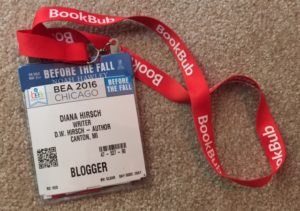
“Well, I didn’t see that. It’s good to see kids interested in reading,” she said, “but it used to be more professional. Now everyone feels so entitled.”
Yes, she used the word entitled. I was insulted.
I caught her eye and said, “I am one of those (finger quote) Bloggers (end finger quote), and I came here to network with others and get ideas and inspirations. Everyone I met was friendly, bloggers and authors and everyone.” Until this woman. Did my finger quotes even register on her?
She looked down at my badge and skipped over the text “Blogger.” Now, in almost every other interaction, people jumped on that title, and not just because it was a larger type. “Oh, what do you blog about?” they asked, interested, curious or hungry. Whatever the intention, I liked that attention. Here, now, those writing talents were snubbed.
“You’re an author. I’ve been in this industry for over 25 years. It’s good to see so many kids interested in reading,” she said, and then I tuned out to whatever she said next. The kids line now sounded like an excuse, and I realized why.
In the old days, she was a god.
Today, authors don’t need agents or publishing houses. We can do it on our own.
I looked for her badge to see her name because I would’ve call her out here, but her jean jacket and crossed arms covered that up. In those long-ago, more professional days, she was courted by hungry agents and desperate writers. Today she is irrelevant, thanks to the bloggers diluting the writing industry. She was dismissing my writing talents, and in that moment, I felt belittled because I was one of those just bloggers.
But she’s no longer the all and powerful. Now she is courting authors, asking them to sign a contract that snatches their story rights. As an author with three self-published books, I don’t need her. To me, she’s irrelevant.
Would I ever want to be published by a legacy, trade publishing company? Yes, I would. It would be cool to walk into a big box book store and hold my book in my hands. It would be great to know that my friend in Arizona is able to pick up my book in the moment and take it home with her. But that accomplishment–so to speak–is a novelty. I wouldn’t sign away my hard work for the presumed prestige of being on a bookstore shelf. I own my own group of ISBNs, and I can print or not print my books as I choose.
That’s the key: I have a choice. I have power.
That Penguin woman, she no longer has god-like control of the market. She no longer has a choice.
“Success is not final, failure is not fatal; it is the courage to continue that counts.”~Winston Churchill, English statesman
A Round of Words in 80 Days. The challenge is detailed here on the #ROW80 blog for all writers, bloggers, artists and whomever has large goals to achieve. This is done four times a year, with Round 1 ending today. This is a summary of my accomplishments–or nots–so you can read my original post HERE.
Which brings me back to A Round of Words in 80 Days. By the end of the first quarter–or ROW80 Round 1 dates of January 4-March 24, 2016–these are my ROW80 Round 1 goals:
HERE ARE MY RESULTS for the first Quarter of 2016:
1–Polish and publish Jimmy the Burglar: Thief of Socks.
NO
There’s no excuse: I got distracted, I put other things first; I was intimidated with a fuller-length fiction story…you name it. I could’ve made the time–I had the time–but I didn’t. This is something to roll over to Round 2, for sure.
2–Find and do a blog self-hosting site.
YES–or at least almost; it’s in progress. I’m just waiting on the final domain name transfer. Have you ever done this? It’s simple yet surprisingly complex. I’ll share my thoughts in future posts, an education I wish someone had walked me thru.
3–Blog planning.
MAYBE
It’s something I’m working on. I blocked off days to post my Haiku Horizon posts, for example, and some days I met them; some days, the post moved; some weeks I never wrote or published the post. “Publishing” a post is the key. Here’s the scary thing: I looked back at my “drafts” folder here on WordPress to see what I could reuse or update.
I had drafts there of 2011 posts.
What the *bleep* happened?!?
The list of 207 drafts includes ideas I was tweaking and blog posts I didn’t finish. This was most likely due to interrupted writing time. Now that I have set aside dedicated writing times, I can take these good, mostly-finished posts and complete them. Or not. Several things I’ve learned from this part of the #ROW80 challenge:
–I’m a good writer.
–I need to Keep Up.
Seeing this shocking revelation can help me blog-plan–I feel it!–but I’m not sure how to translate the feeling, this newfound confidence or whatever it is, into something practical.
3A-The Blog Planning goal included scheduling social media.
NO
This goes back to blog planning: what do I want my Twitter; Instagram accounts to achieve? What do I expect from my Facebook and Amazon Author Pages? A great idea came from a blog and Instagram accountabout defining yourself and your audience. Hers captured what I think I want: “people like me who read any books and all subjects, like to read YA and other subjects.” She has a bookstagram acct–I’ll detail that later–but it made me think about my mission statement, and maybe that will be a #ROW80 goal next round.
Back to social media, I need to see how that fits into my life. I’ve got the writing planning down with carved out spaces in my days week to do it, so work in these other tasks.
4–Update my blog: About Me, Resources and other tabs.
NO
Sounds like a copout excuse, but without defining “me” I can’t update my site to reflect that. Self-host and getting rid of the “wordpress” in website address was Step 1, so this is manageable. It still feels like playing, not actual working, and not sure how to let that go in myself
5–Fractured finger, heal thyself.
YES
Or so I think. Weds, April 20 is perhaps final-final appt. It’s haealed or healing it feels like it has movement most days, but doc sayas it may take a year or more to fully heal. Will it ever fully heal?
6–Make progress on memoir My Father, My Friend.
NO
And I feel like a total failure for that (also see #1 above)
I have writing time carved out. But I’ve let other things take over my time, ironically blog planning (see #3 above) has been a factor in this. Balance–need to achieve that.
7–Make time to play.
YES
I scrapbook old photos, doing that dreaded word scrapbookers quiver at: “catch up” That’s okay; I’m overwhelmed with past projects and layouts, but any progress is a step forward. I’ve scrapbooked with a friend of mine, and I rediscovered joy in playing with paper. I’ve stepped back a bit from ATCs and altered art; I’m not feeling that vibe now, but that may be a break I need. Writing and all that goes along with it (see #1, 3, 4, 6 above)
8–Do some fun writing.
YES
A bit. I wrote a fiction short story I began for Storytime Friday over on A Life Among the Pages and never finished. I’m still not done, but I had fun traversing along the world my mad, mad, mad, mad mind created.
In closing, my thoughts in review:
–I need to manage my time, but I know I can.
–I need to re-read my notes from Rochester Writers Fall Conference and review how the romance author publishes four books a year. She has a schedule, and that’s what I based Jimmy the Burglar: Thief of Socks goal on.
–This has been a gentle, and not so gentle, slap in the face of how I’m using my time.
Let’s see how I revise all this for Round 2. If you’ve participated, let me know how your goals went and your thoughts on the challenge.